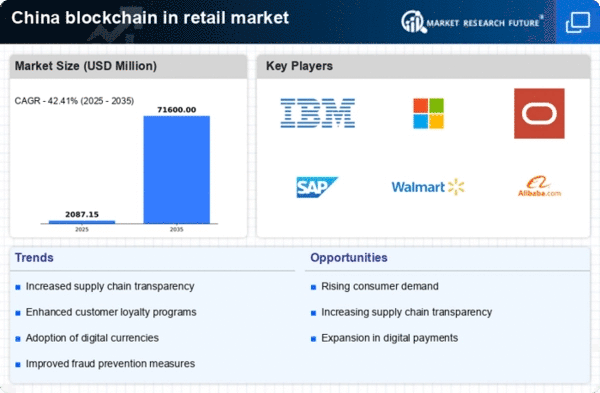Rising Demand for Traceability
The blockchain in-retail market in China is experiencing a notable surge in demand for traceability solutions. Consumers increasingly seek assurance regarding the origin and quality of products, particularly in sectors such as food and pharmaceuticals. This trend is driven by heightened awareness of food safety and authenticity issues. According to recent data, approximately 70% of Chinese consumers express a preference for brands that provide transparent supply chain information. Consequently, retailers are adopting blockchain technology to enhance traceability, allowing them to track products from source to shelf. This not only builds consumer trust but also helps retailers comply with regulatory requirements. The integration of blockchain solutions is expected to grow, with projections indicating a potential market expansion of over 30% in the next five years, as businesses recognize the value of transparency in fostering customer loyalty.
Regulatory Support and Frameworks
The blockchain in-retail market in China is benefiting from supportive regulatory frameworks that encourage the adoption of blockchain technology. The Chinese government has been proactive in establishing guidelines and standards for blockchain applications, particularly in sectors like retail. This regulatory environment fosters innovation while ensuring consumer protection and data security. Recent initiatives indicate that the government aims to promote blockchain as a key technology for enhancing supply chain efficiency and transparency. As a result, retailers are more inclined to invest in blockchain solutions, knowing that they operate within a supportive legal framework. This trend is expected to drive market growth, with estimates suggesting that regulatory support could contribute to a 25% increase in blockchain adoption among retailers over the next few years.
Increased Investment in Technology
Investment in technology is a critical driver for the blockchain in-retail market in China. Retailers are allocating substantial resources to adopt innovative technologies that enhance operational efficiency and customer engagement. In 2025, it is estimated that investments in blockchain solutions will reach approximately $1 billion, reflecting a growing recognition of the technology's potential. This influx of capital is likely to accelerate the development of blockchain applications tailored for retail, such as secure payment systems and inventory management solutions. Furthermore, partnerships between technology firms and retail companies are becoming more prevalent, fostering an ecosystem that encourages innovation. As a result, the blockchain in-retail market is poised for significant growth, with businesses eager to leverage technology to gain a competitive edge in an increasingly digital landscape.
Consumer Demand for Enhanced Security
Consumer demand for enhanced security is a pivotal driver in the blockchain in-retail market in China. With rising concerns over data breaches and fraud, consumers are increasingly prioritizing secure transactions and data protection. Blockchain technology offers a decentralized and immutable ledger, which significantly reduces the risk of data tampering and fraud. In 2025, it is projected that around 60% of consumers will prefer retailers that utilize blockchain for secure transactions. This shift in consumer behavior is prompting retailers to adopt blockchain solutions to safeguard customer information and build trust. As security becomes a paramount concern, the blockchain in-retail market is likely to witness accelerated growth, with businesses striving to meet consumer expectations for secure shopping experiences.
Emergence of Innovative Business Models
The emergence of innovative business models is reshaping the blockchain in-retail market in China. Retailers are exploring new ways to engage customers and streamline operations through blockchain technology. For instance, concepts such as decentralized marketplaces and peer-to-peer transactions are gaining traction. These models leverage blockchain's capabilities to facilitate direct interactions between consumers and producers, reducing intermediaries and associated costs. In 2025, it is anticipated that approximately 40% of retailers will experiment with blockchain-based business models, aiming to enhance customer experiences and operational efficiency. This trend not only fosters innovation but also encourages competition within the retail sector, as businesses seek to differentiate themselves by adopting cutting-edge technologies. The blockchain in-retail market is thus positioned for dynamic evolution, driven by the quest for novel approaches to retailing.
















